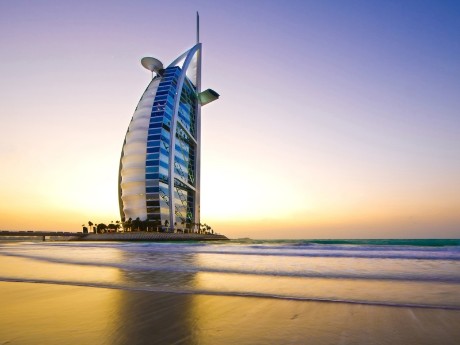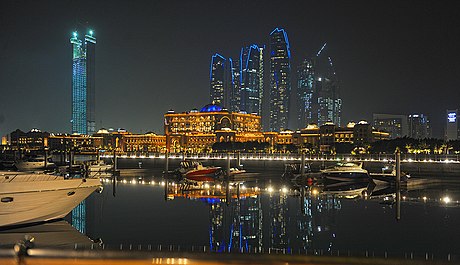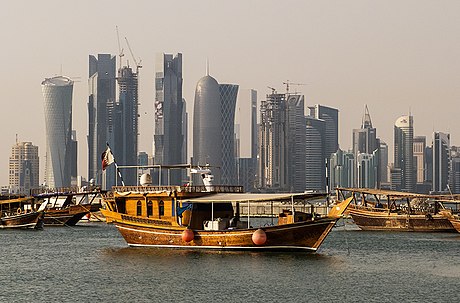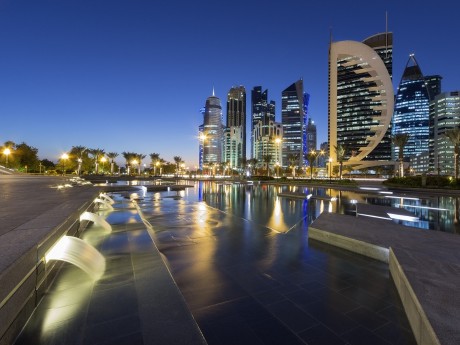Middle East: Dubai, Abu Dhabi and Doha
Embark on a trip to explore the Arab World Culture at its fullest. Begin in UAE, known as the Las Vegas of the Middle East. From Royal Palaces, monuments, world class museums to amusement parks, desert safaris, diving experiences, shopping till you drop, its all here. There is no time for boredom in UAE.
Read more
Embark on a trip to explore the Arab World Culture at its fullest. Begin in UAE, known as the Las Vegas of the Middle East. From Royal Palaces, monuments, world class museums to amusement parks, desert safaris, diving experiences, shopping till you drop, its all here. There is no time for boredom in UAE. Take a desert tour, visit the Arab Cultural Museum, Royal Palaces, the Aquarium, go diving, sailing, duty free shopping at the Dubai Mall (the world's largest), go to an entertainment show, dance the night away or just spend time on the beach, you will not regret visiting here. In Qatar, Doha's iconic Souq Waqif has incredible treasures, the Museum of Islamic Art and National Museum of Qatar offer a treasure trove of history and education in Arab Culture, and the museum of illusions will take your breath away, This indeed is a one of a kind trip. Waterviews strives to offer accommodation options within walking distance of water and/or in an area of touristic interest. Our prices include taxes (but excludes local tourist taxes). Customize your trip to your personal preferences with optional activities (hit the “Add Activities’’) or change hotels, etc. Contact us for customization at no extra cost at: Service@waterviewstravel.com
Destinations
- Dubai
- Abu Dhabi
- Doha
Itinerary
Dubai

Dubai (Arabic: دبي) is a cosmopolitan metropolis and global city on the Arabian Peninsula. The city is one of the ten most popular tourist destinations in the world. The city is also considered one of the most modern and progressive cities in the Middle East - certainly in the Arab world - and is also sometimes nicknamed as "City of Gold" due to historically being a hub for gold trade as well as the rapid transformation from a desert into a luxurious city.
Dubai is characterized by a vast landscape of desert which transforms into a futuristic style of skyscrapers along the coastline. The city offers both insights to the old merchant and pearl diving history of the Arabs in Deira and Bur Dubai and the new modern skyscraper business and bustling life in Jumeirah and Jebel Ali. Dubai is sometimes mistakenly thought of as a country, however it is an Emirate and is part of the United Arab Emirates. It is the financial centre of the United Arab Emirates.
Dubai is also considered a commercial and cultural hub of the Middle East, it's a global transport hub, and has attracted world attention through many large innovative construction projects and sports events. The city is symbolised by its skyscrapers, including the world's tallest building, Burj Khalifa, in addition to ambitious development projects including man-made islands, world class luxury hotels, and some of the largest and extraordinarily modern shopping malls in the world.
Read more
Dubai (Arabic: دبي) is a cosmopolitan metropolis and global city on the Arabian Peninsula. The city is one of the ten most popular tourist destinations in the world. The city is also considered one of the most modern and progressive cities in the Middle East - certainly in the Arab world - and is also sometimes nicknamed as "City of Gold" due to historically being a hub for gold trade as well as the rapid transformation from a desert into a luxurious city.
Dubai is characterized by a vast landscape of desert which transforms into a futuristic style of skyscrapers along the coastline. The city offers both insights to the old merchant and pearl diving history of the Arabs in Deira and Bur Dubai and the new modern skyscraper business and bustling life in Jumeirah and Jebel Ali. Dubai is sometimes mistakenly thought of as a country, however it is an Emirate and is part of the United Arab Emirates. It is the financial centre of the United Arab Emirates.
Dubai is also considered a commercial and cultural hub of the Middle East, it's a global transport hub, and has attracted world attention through many large innovative construction projects and sports events. The city is symbolised by its skyscrapers, including the world's tallest building, Burj Khalifa, in addition to ambitious development projects including man-made islands, world class luxury hotels, and some of the largest and extraordinarily modern shopping malls in the world.
Additional Information
History
Dubai was initially a small fishing village on the coast of the eastern Arabian Peninsula. At the beginning, the town made it's income as a small pearl diving town. However, as expanding trade boomed across the gulf, it became a trading hub between Iran and India and gained a lot of notoriety for its imported goods from the east. In fact, the currency of Dubai used to be the Indian rupee historically. It was also used as a smuggling town to smuggle gold from Africa and elsewhere and import it to India, this made Dubai a well know point in the map for various traders. When oil companies looked for oil around the Trucial States, Dubai was shown to not have any significant oil reserves compared to Abu Dhabi. Sheikh Rashid Al Maktoum, then the leader and Sheikh of Dubai, continued on the booming expansion of trade in Dubai instead of relying on any oil income. He welcomed Indian traders, Iranian traders, and even western officials and travelers in his hometown. The open policy of commerce and tolerance of foreigners made Dubai a willing destination for any non-Arab or non-Muslim, in stark contrast to other cities in the Arabian peninsula who viewed non-Muslims with suspicion. Sheikh Rashid's son, Sheikh Mohammed, had a vision of establishing Dubai as the middle eastern tourist destination. In his memoir, when he met with other GCC head of states after the British withdrawal from the gulf and proposed on making Dubai a tourist destination, the rest of the Sheikhs laughed at him. They told him nobody would like to come and visit a barren desert. Nevertheless, Sheikh Mohammed made the effort of hiring tourism experts and changed the entire infrastructure of the city to welcome tourists, established free-zones with no taxes,invested in major tourism projects and opened the city for everyone regardless of race or religion. Multiple western companies and institutions, wanting to expand their influence in the middle east, welcomed Dubai's tax-free open arm invitation. Dubai was seen as the only city in the Arabian peninsula that would allow non-Muslims to live, drink, and enjoy their lives by their own laws and western or non-Islamic standards.
Destination
Just a five hour flight from Europe and three hours from most parts of the Middle East, the Near East, and the Indian subcontinent, Dubai makes a great short break for shopping, partying, sunbathing, fine dining, sporting events, and even a few sinful pleasures. Its situated ride in the middle of the Middle East and was considered a great spot to stop for someone traveling from east to west or west to east. This brought the city into the influence of the rest of the world. Western and eastern traders all established outposts and communities in the city. Despite the fact that Arabic is the official language, due to the fact that foreigners outnumber Emiratis by almost 4 to 1 in Dubai, English serves as the lingua franca. All signs are bilingual in Arabic and English and speaking Urdu, Hindi, or Tagalog will help you further than Arabic considering most of the population are expatriates from Pakistan, India, and the Philippines. The weekly day off is Friday as it is considered the end of the week and a blessed day in Islam. Since September 2006, a harmonized weekend of Friday and Saturday has been adopted for the public sector and schools. Government departments, multinational companies, and most schools and universities take Friday and Saturday off.
Climate
The city of Dubai is situated on a coastal strip bordered by desert and gets very hot in the summer. It is dry on the hottest days and humid during the cooler days in the summer. Cooler, more pleasant weather lasts from the end of September to the beginning of May (although pleasant is relative, with daily temperatures from October to January and March to May still being , but be prepared for cold night temperatures. In winter the temperature at night is usually from . From May to September, the sun is intense and in August temperatures can touch in the city and even higher in the desert. The heat, coupled with a humidity of 60%–70% near the coast, effectively precludes most activity outdoors for the daylight hours during summer. Summer and winter are effectively the only two noticeable seasons the city experiences.
December to April generally produces the highest precipitation, though little of it, at 100 mm total per year. Some years yield no more than a few minutes of shower. Rain is celebrated in the UAE and most people take days off and some schools give rain days off to enjoy the little amount of precipitation the city experiences.
© Sourced from Wikivoyage
Abu Dhabi

Abu Dhabi is the federal capital and the seat of the three branches of government of the United Arab Emirates. It is the largest city of the Emirate of Abu Dhabi.
The city is essentially a collection of islands connected together and features colossal monuments, elegant museums, green boulevards, high-rise buildings, international luxury hotel chains and opulent shopping malls.
Read more
Abu Dhabi is the federal capital and the seat of the three branches of government of the United Arab Emirates. It is the largest city of the Emirate of Abu Dhabi.
The city is essentially a collection of islands connected together and features colossal monuments, elegant museums, green boulevards, high-rise buildings, international luxury hotel chains and opulent shopping malls.
Additional Information
History
Abu Dhabi is the capital and seat of the government of the United Arab Emirates, hence it is the go-to destination for any major political event or ministerial headquarters. The city was not intended to be the capital of the UAE. The capital of the UAE was supposed to be a planned city between Abu Dhabi and Dubai and was to be called 'Al Karama' (which means dignity in Arabic) as stated in the first version of the constitution. However, considering the earlier stage of the union was a volatile time, with multiple issues and various ordeals occurring, Abu Dhabi was made the temporary capital as it was the home of the UAE founding father Sheikh Zayed. Later stage, Abu Dhabi was declared to be the permanent capital of the UAE by the agreement of the rest of the seven UAE founding fathers. The capital and the seat of the three branches of the government was set to be in the Abu Dhabi Capital District, while the rest of the city would continue to be a city catered to the native population and residents. Abu Dhabi is also the headquarters of the United Arab Emirates Armed Forces, with an enormous walled city outside of Abu Dhabi called Sheikh Zayed Military City hosting the defensive headquarters of the military. As a result, it is a common sight to see Emiratis in military fatigue around the city. Non-Emiratis are strictly forbidden from entering any military building except with prior authorization.
People
Many international companies, diplomatic outposts, and embassies are based in Abu Dhabi. The city has a population of approximately 1.5 million residents, while the native population forms the minority with approximately only 420,000 UAE nationals in the entire emirate. In a bid to attract foreign investors and urban planners, the city followed in Dubai's footsteps by forming tax-free zones, loosened Islamic laws, and increased real estate sales to expatriates. As a diplomatic center of the government, various monuments and museums were built. The most recognizable icon is the Sheikh Zayed Grand Mosque which is a common visiting site for tourists and diplomats. The mosque allows non-Muslims to enter and explore the Islamic architecture of the mosque. Various monuments honoring Emirati achievements also exist, with the most commonly recognized the Oasis of Dignity (called Wahat Al Karama locally). The large monument faces the mosque and has the names of fallen Emirati soldiers inscribed in the memorial.
Diplomacy
In order to build the international status of the city as a diplomacy center, the UAE government formed very close relationship with other governments; most recognizably France and the United States. As a result, a lot of American-based companies and personnel are based in the city. The American embassy is the largest embassy in Abu Dhabi and almost recognizable as a landmark with its triangular design, as well as Abu Dhabi airport is one of the few airports which allows pre-clearance immigration to the United States; allowing travelers to enter the US as domestic US travelers.
The official language of Abu Dhabi and the rest of the UAE is Arabic, however English is the de facto lingua franca, and almost everyone speaks it. All signs are bilingual in Arabic and English and the city's atmosphere is very friendly to visitors. Occasionally, foreign head of states visit Abu Dhabi, so seeing roads lined with flags of various countries is a common sight. Seeing F-16 fighter jets flying over the skies of Abu Dhabi is also a common sight, as a major UAE-US airbase (Al Dhafrah airbase) is near the city and sometimes jets escort foreign dignitaries traveling to the UAE. The city's vibe changes depending on which foreign head of state visits it. The city was decorated with Chinese flags and the red color when the Chinese president visited, while the city was garnished with yellow and white when Pope Francis visited. The UAE flag is almost always everywhere, decorated with the red-white-black-green colors decorating the streets, buildings, tunnels, and skyscrapers.
Entertainment
The city has also been expanding its entertainment industry vastly, creating massive projects such as Formula 1 track, the Ferrari World theme park, and Warner Bros. World Abu Dhabi. There are several museums, such as the Louvre Abu Dhabi, Guggenheim museum (under construction), and the UAE's national museum - Zayed Museum (under construction).
The city is also a frequent host of Judo competitions by the International Judo Federation, Formula One races, and Ultimate Fighting Championship (UFC) championships. The city also hosts the finals of the UAE football Pro-League as well as Asian Federation Cup games in Sheikh Zayed Sports Stadium.
Climate
The city has an arid climate, with very hot temperatures in the summer. Annual precipitation totals 57 mm.
Orientation
Most of Abu Dhabi is on a wedged-shaped island connect by two bridges to the mainland, and two other bridges to other islands which also eventually connect to the mainland.
Street addresses in Abu Dhabi are simultaneously very logical and hopelessly confusing. Many roads have traditional names, like "Airport Rd", which may not correspond to the official names, like "Maktoum St", and the city is divided into traditional districts like "Khalidiyya". However, the city has been split up into numbered "zones" and "sectors", with all roads in each sector numbered, First St, Second St, etc., and the vast majority of street signs only refer to these. The system of main streets is straight forward enough once you realize that the odd numbered streets run across the island and the even numbers run along it. So First St is in fact the Corniche, and the odd numbers continue out of town to 31st St which is near the new Khalifa Park. Airport Rd is Second St and the even numbers continue to the east through to 10th St by Abu Dhabi Mall. On the west side of Airport Rd, the numbers go from 22nd Street to 32nd St by the new Bateem Marina. Alas, confusion is caused by the local streets, which are on green signs (main streets are on blue signs) and are also called First, Second, etc. Most locals opt to ignore the system entirely, and the best way to give instructions is thus navigating by landmarks, if taking a taxi, odds are you will get to "behind the Hilton Baynunah" much faster than "Fifth Street, Sector 2". Thankfully, GPS and Google Maps have made life much easier. Using ride-share apps or even telling the name where you want to go to a taxi driver will let them immediately know where exactly you want to be dropped.
© Sourced from Wikivoyage
Doha

Once little more than a minuscule pearl fishing village, Doha, Qatar's capital and largest city, has emerged to become one of the pearls of the Middle East. It is one of the most rapidly-developing cities on the Persian Gulf, akin to the development seen in nearby Dubai and Abu Dhabi, and is aiming to become a centre of international trade and travel.
Read more
Once little more than a minuscule pearl fishing village, Doha, Qatar's capital and largest city, has emerged to become one of the pearls of the Middle East. It is one of the most rapidly-developing cities on the Persian Gulf, akin to the development seen in nearby Dubai and Abu Dhabi, and is aiming to become a centre of international trade and travel.
Additional Information
For most of its history Doha was a poor fishing village dependent on pearl diving, and was regarded as a sleepy backwater until as recently as the early 1990s. Following the accession of Sheikh Hamad bin Khalifa Al Thani as Emir in 1995, however, Qatar quickly began to modernize, and Doha is now taking huge strides to catch up with other nearby Gulf cities, especially in preparation for its hosting of the FIFA World Cup in 2022. The city is very much a work-in-progress, with a rapidly growing skyline and new buildings sprouting up almost like mushrooms.
For most visitors, Doha is synonymous with Qatar, as the vast majority of the country's population resides in the capital city. Doha has an astonishingly diverse population – just 13% of residents are native Qataris. Although Arabic is Qatar's official language, English is by default the lingua franca, as the majority of the city's expats do not speak Arabic, including most shopkeepers and service providers, and most Qataris speak English to communicate with the numerous migrant workers who work for them. Doha is also now one of the fastest-growing cities in the world, as workers continue to pour in to help build the developing economy.
Doha is fairly liberal by the standards of the Islamic world, though less so than most Western countries. Alcohol is legal for non-Muslims, and non-Muslim women are not required to wear the hijab, though dressing in very skimpy outfits is still illegal. That said, Qatar is an absolute monarchy, so criticising the Emir is a crime. Homosexuality is also a crime that carries the death penalty (though not actively enforced), so gay visitors should try to be as discreet as possible.
If you've visited before, be assured that Doha today is not the same as it was just a couple of years ago, and will be very different again in a few years time.
Read
Mohanalakshmi Rajakumar, From Dunes to Dior. Written by a resident Indian-American, this is a collection of insightful essays about life as an expatriate in Doha. Mohanalakshmi Rajakumar, Love Comes Later. Set in Doha and London, this novel examines Qatari culture and how young Qataris are now challenging the status quo. The book is not available in Qatar as it has been banned by the Qatari Ministry of Culture.
© Sourced from Wikivoyage





